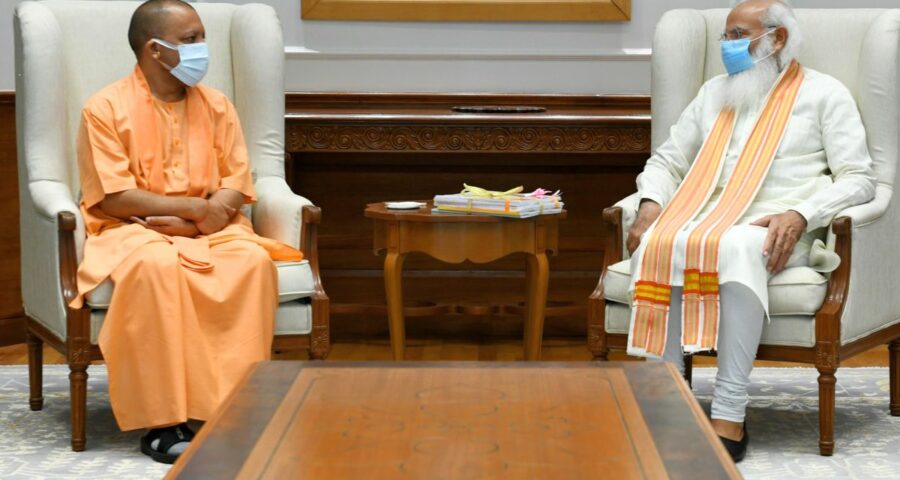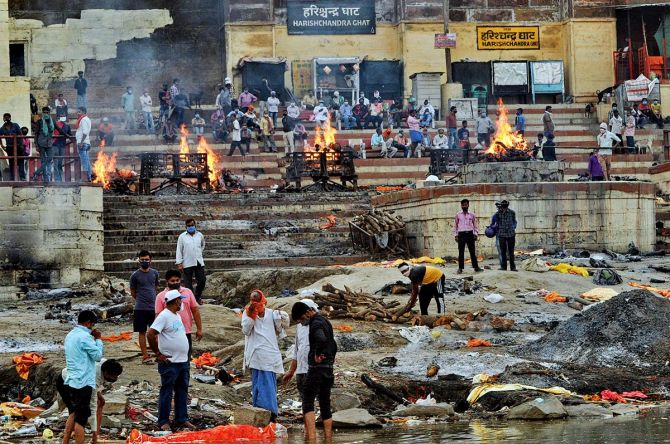‘After meeting the prime minister and Amit Shah, Yogi has come out with his position secure till the assembly election.’
“Communal polarisation used to be a one-time event; now it is a constant process. It does not stop even during a pandemic,” Dr Prashant Trivedi, professor, researcher and social analyst with special focus on Uttar Pradesh, tells Rediff.com‘s Archana Masih.
The peak of the second wave is over and people tend to forget — but when Covid has taken your loved ones, how do you think it will impact the Yogi Adityanath government in the UP assembly election?
The state government miserably failed in managing the second wave crisis. In fact, it turned the crisis into a catastrophe because of the poor decision to go ahead with the panchayat election.
During the first wave, UP was relatively safe. 70% of UP lives in villages and the returning migrants were quarantined in government buildings like panchayat bhavans or schools before they went back to their homes.
This prevented the spread of the virus.
In the second wave, the government adamantly went ahead with the panchayat elections. It is a well-known fact that many people returned from various states to cast their votes in the panchayat elections. Many returnees brought the infection with them which then spread in the rural areas.
Hence, the villages were hit hard and many died. The crisis was visible in the number of bodies found floating in the Ganga and queues for cremation in cities like Lucknow.
People realise that this government is an utter failure, at least in terms of administration capabilities, crisis management and issue of governance.
But I am not sure what impact it will have on the forthcoming assembly election because it is almost a year between the election and the second wave. Even those who have lost family members will have had time to heal.
The government is relying on communal polarisation which will push issues like governance, development, jobs, health on the backburner.
A few weeks back, there were rumblings of criticism within the state BJP against the chief minister over the handling of the pandemic. Have cracks emerged in Yogi’s strong image persona?
The discontent is visible. One BJP member and former MLA said that over 10 lakh people died during the second wave. Another BJP MLA said that if he spoke against this government even he would be booked under charges of sedition.
But after meeting the prime minister and Amit Shah, Yogi has come out with his position secure till the assembly election.
The BJP won more than 75% seats in the last assembly election. If the BJP performs well under Yogi Adityanath, then the road ahead will be smooth for him.
If he fails to perform, then he will be on a weak wicket.
As of now, he is on the safe side.
With the Ram Temple on course, what do you think will the polarising issues this time?
The difference between the current and previous governments, including BJP governments of the past was that once they came into power, they followed what Atal Bihari Vajpayee used to call ‘Raj Dharma’.
They governed the state irrespective of religious or caste identity. They ensured that the state remained peaceful and communal incidents did not take place. They wanted to ensure that no communal riots happened at least during their governance.
Now even those in the government make communal remarks.
Earlier, communal polarisation was a one-time event; now it is a constant process. It does not stop even during a pandemic.
Nobody could have imagined that a pandemic that affected everybody could be turned into an issue of communal polarisation.
Communal polarisation will continue day and night. It does not need any new issues. It’s an ongoing process.
What challenge can the Samajwadi Party and Bahujan Samaj Party pose — if any?
The fate of the Opposition is miserable. They don’t have any political agenda for rallying the people.
In 1992 when the BJP’s Ram Mandir agenda was at its peak the SP and BSP came together on the plank of social justice and were able to stop the BJP in the 1993 assembly election.
But in the last 25-30 years, the SP has transformed under the leadership of Akhilesh Yadav. It does not own the plank of social justice anymore. Similarly, for BSP.
Opposition parties do not have any ideological social plank to counter the BJP’s Hindutva campaign. They do not have political imagination and do not have anything to offer the voters.
They are relying on local level management like caste equations which will not be able to withstand the aggressive propaganda of the BJP. The Opposition has poverty of political imagination.
The SP has a good rank and file; the BSP as of now will hold onto its vote, but they are no match for the BJP’s Hindutva agenda.
Where does the Congress feature in the equation?
The Congress is a different kind of party. It is not a cadre-based party, it does not have a well-knit organisation. It relies on leaders at the local, state and national level.
The Congress tried to woo Brahmins who are not as happy as the Thakurs because Brahmin leaders felt sidelined.
Brahmins are around 10% of the electorate and form a large part of the urban middle class which is the main vote base of the BJP.
They are not happy with the BJP, but as of now the Congress has nothing to offer them.
Even if Jitin Prasada had remained in the Congress, it would not have affected the fortunes of the party.
Sections of voters who are unsatisfied with the BJP might not shift to another party because the Congress/SP/BSP have nothing for them. They might not go out to vote or participate or get swayed by the propaganda of the BJP.
Feature Presentation: Aslam Hunani/Rediff.com
Source: Read Full Article


